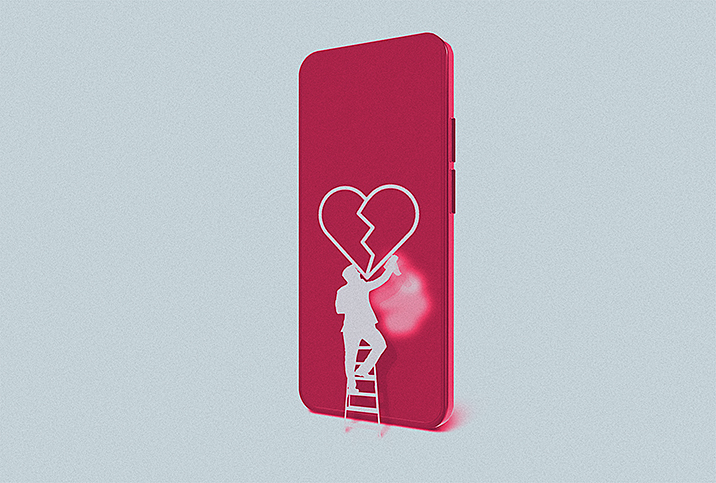To Disclose or Not to Disclose: Secrets, Lies and Relationships

Entering into a romantic partnership requires compromise on every level. You adjust your daily routine to spend quality time together, you sacrifice physical space to merge your life and belongings with another's, plus more. But should the truth be compromised in order to keep the peace or maintain a sense of individual privacy?
Relationship therapists and researchers alike find that more often than not, opening up and being truthful with your partner creates a healthier relationship overall in which trust can flourish.
Janell Cox, a licensed marriage and family therapist in Los Angeles, said a secret erodes trust between two people, not allowing either party to feel 100 percent emotionally secure.
"Existing in a space like this is like being suspended in the air with no cables or connection," Cox explained. "It is scary, emotionally chaotic, and makes you feel distant and separate from your partner. Once trust is broken, it needs to be addressed and cared for like a deep cut, allowed to heal and be learned from."
Why do people lie?
Cox said patterns of dishonesty in adulthood may develop as a defense mechanism or trauma response, stemming from a childhood that treated full disclosure as a burden or problem.
"For those who have an unhealthy relationship to truth, there wasn't a solid person on the other side of them growing up that said, 'I can handle all of your big feelings. Throw anything you want at me. You are safe and loved,'" she said. "What follows is a child or teenager who starts to experiment with making stuff up, because maybe that can impress people. They may think, 'If I sprinkle some sparkle on top of all of this badness inside of me, maybe then I will be loved.'"
Trauma begets trauma and people partnered with people with a tendency to lie may develop a damaged inner compass, blurring the lines between the truth and fabrication.
"The biggest damage done by someone lying to you over and over is the destruction it does to your intuition and connection to your inner-knowing," Cox said. "If you find yourself constantly off your center, doubting yourself or confused, these are red flags. Your sense of self has been messed with. You need to examine your relationship with the truth and see if you and your partner are on the same page with it. It is vital to your relationship with yourself that you are with a partner who shares your value for truth and honesty."
Maintaining privacy doesn't mean keeping secrets
We know lies don't produce healthy partnerships, but does this mean you have to tell your partner everything on your mind at all times? Cox said it's possible to maintain a robust sense of inner privacy, as well as a full life apart from a partner, while in a close relationship. In fact, everyone deserves it.
"No person should have full access to us. We deserve to explore our inner world, as well as our outer world, where we derive joy, fulfillment, higher learning and purpose," Cox explained. "Our romantic relationships should blend into our full lives, but we need a community of family and friends, a career and other activities where we get to be different versions and expressions of ourselves and speak freely to others about what is in our hearts."
What do we need to disclose?
There's no absolute formula to calculate what you should share with your partner, but Cox and others offer some guidelines to determine what is need-to-know information:
Addiction
Cox said when it comes to addictions to substances or behaviors like gambling, gaming, shopping or watching porn, full disclosure is paramount.
"It is never okay to hide an addiction," she said. "This is destructive and has the potential to ruin a relationship and break down trust. Both partners should seek help to stop this cycle."
Attraction to others
On this topic, Cox examined a spectrum of healthy responses. For some couples, a "don't ask, don't tell" policy acknowledges the normalcy of finding more than one person attractive at any given time. If couples choose to share their attraction with another, this may open the door to larger conversations about what needs are going unmet within the relationship.
"I think the attraction to another human outside the relationship is mostly information about an unmet desire or longing that needs to be explored within your life," she said. "I find it mostly unnecessary to share the attraction to another with your partner, but it's very necessary to express the desire or longing for love, touch, sex, play or romance with your partner that this feeling has ignited."
Infidelity
If cheating occurs, Cox recommends opening up immediately and beginning the long road to rebuilding trust.
"With the help of couples therapy, as well as boundaries and communication, the couple will need to open up and go into repair mode, which would be a heightened state of self-disclosure from the person who cheated or lied," she said. "This could include scheduled times to produce evidence, hand over passwords, allow the partner to look at their phone, take a lie detector test or anything else that gives full proof of honesty. This should be done in a controlled, agreed-upon and respectful fashion for a temporary amount of time, as witnessed by a couples therapist."
Sexual experiences and preferences
Researchers have found that open communication around your sexual history, likes and dislikes may actually strengthen your relationship.
In an article published this year in the journal Sex Cult, researchers Lacey J. Ritter, Tara Martin, Keely Fox, David Knox and Susan Milstein found that revealing secrets of a sexual nature to a partner often resulted in neutral or even positive relationship outcomes.
"Disclosure of sexual secrets almost never [less than 5 percent] resulted in relationship dissolution, and over a third of the sample reported that they appreciated the honest disclosure. In addition, keeping sex secrets was related to lower relationship satisfaction such that each additional sex secret being kept from a romantic partner was associated with a one-half point loss of satisfaction (on a 5-point relationship satisfaction scale)," wrote Ritter and colleagues in "Thanks For Telling Me: The Impact of Disclosing Sex Secrets on Romantic Relationships."
Cox is careful to note that when a secret keeps you from "growing with, connecting with, showing up for and leaning into your partner," it may be time to start talking.
"If a partner finds themselves more strongly aligned with an outside source than with their partner, this is detrimental to the strength of the relationship and problematic," she explained. "Examples include confiding in, confessing to, sharing with and seeking out comfort from others in lieu of your partner. This can leave the other partner feeling hurt, neglected, betrayed, left out and kept away from the partner."
Creating opportunities for honesty
Ultimately, as the adage goes, truth prevails. Like any other skill, Cox recommends practicing telling the truth to those close to you until it becomes second nature, keeping conditions like consent and timing top of mind. The result, she said, is a relationship built on unbreakable bonds of trust.
"We are constantly finessing an unspoken dance of closeness and distance in any relationship," Cox said. "Timing is everything. Ask for permission to check in with your partner around issues. Request their sacred attention and talk about what is in your heart. As long as you are both available, communicating what is on your mind is one of the strongest ways of keeping relationships healthy. If you find speaking your truth creates conflict, maybe your partner is showing you that they don't share this level of commitment to it. Perhaps you need to look at this and create a new agreement. Or find a new partner."




















